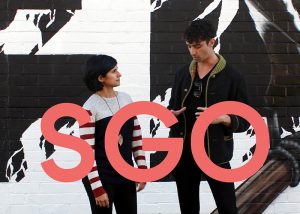I was pleasantly surprised by the blue skies and sharp autumn air of Beijing as I stayed over the weekend. I was attending a select forum at Peking University (Bei Da) called the Emerging Leaders’ Dialogue with eleven other Griffith University students, making up a cohort of 12 students from China and 12 from Australia. For a 24 hour conference, it was a bit of a whirlwind and a great experience to see a part of China I hadn’t yet visited. The conference included a great networking evening involving some premier members of the Australian Chamber of Commerce in Beijing, as well as Tom Luckock of Norton Rose Fulbright, a number of Prime Minister’s Asian Award scholars and Griffith academics. A particular highlight was meeting and talking with Haig Patapan, an academic whose journals I am constantly studying. I also thoroughly enjoyed talking to the Director of the Griffith Asia Institute, Andrew O’Neil, and found the event was very useful as I otherwise wouldn’t have had the opportunity to meet such esteemed academics and talk about all range of interesting ideas!
I loved the opportunity to meet the Chinese students from Bei Da and I think we did an excellent job of getting to know them in the limited time we had. It was great to see students from a whole range of academic areas – from international political economy to history to literature to law. The task we students were set was to come up with the key factors driving the Australian-China relationship in the next 17 years (till 2030) – a good topic because we often focus on what the future relationship will be, not what will drive it. Of course, the usual education, investment and innovation came up, however I am happy to say that my group (including my Griffith peers Julien Rosendahl and Ethan Bowering) came up with something a bit different.
International relations frequently assumes that economics, security and trade form the basis of Sino-Australian relationship-building. However this ignores the basis of much of the real-life, people-to-people connections that are formed between China and Australia. We found that there was a disconnect, whereby the citizens of both countries held misconceptions, stereotypes and limited knowledge of each other and each other’s social and political situation. These attitudes are in the main not formed by economics and trade, but by the power of culture (in this case, a lack of cultural exchange happening in public spheres of influence in both countries). Therefore the key driver for the future of the relationship we believe lies in soft power, the power to influence others culturally, socially and on a human level through popular culture and capital. It includes the presence of movies, music, theatre, festivals, fashion, art, and the celebrities of each other’s culture being used as cultural exports.
For example, cultural trading has been a mainstay of relationships between Japan and Australia for a number of years. If you ask any Australian, they are likely to know something of the culture and situation of Japan and have a connection with their culture – be it through manga, anime, Hello Kitty or sushi. It is a way for the ordinary Australian, who otherwise does not have a relationship to Japan, to make that connection. Similar applies to South Korea, a country that has been gaining an incredibly positive reputation over the past few years for its exports of K-Pop (Gangnam Style) and food, just two examples. The reality will be that China will want to get on the bandwagon and will ramp up its cultural exports even for the simple motivation of competition against their neighbours. The side effects, however, flow far greater than competition and provide an opportunity for both Australia and China to engage in an easily relatable and permeable way.
For the next 17 years we believe soft power will pave the way for greater interpersonal (as well as intercultural) understanding and an ability to relate to and connect with “the other”. Through these popular mediums, soft culture goes further than targeting the business and government elite, but actively involves the ordinary public.
At the end of the conference we fortunately had time to visit the Forbidden City, the Summer Palace, Tiananmen Square and the Great Wall. I am actually incredibly surprised we managed to do so, considering we had only two full days (and two half days), however I can safely say I enjoyed every minute of it. Griffith University and Griffith Asia Institute has done a lot to foster relations between ourselves and China, so I am very grateful for the opportunity. I think it should be the forefront of our learning and engagement to do events like this and am excited to see what the Asia Institute comes up with next year. A big thanks to Natasha Vary and Andrew O’Neil for organising such an event!
If you want to know a bit more – Griffith Asia Insitute








